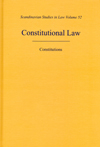| |
Pris: 367 SEK exkl. moms  |  Constitutions make up the foundations of societies and from a historical point of view there is little doubt that constitutional law and its various manifestations has had a crucial impact on the development of modern society. At a more detailed level constitutions provide meta rules about how state mechanisms and rule-making processes in a given society are intended to function. In this respect constitutional law sets up authoritative frameworks for how the administration is build up, and ultimately determines the nature of the relationship between a state and its citizens. Consequently it is also fair to say that constitutions define important components of national identities. Constitutions make up the foundations of societies and from a historical point of view there is little doubt that constitutional law and its various manifestations has had a crucial impact on the development of modern society. At a more detailed level constitutions provide meta rules about how state mechanisms and rule-making processes in a given society are intended to function. In this respect constitutional law sets up authoritative frameworks for how the administration is build up, and ultimately determines the nature of the relationship between a state and its citizens. Consequently it is also fair to say that constitutions define important components of national identities.
The publication of this volume is well timed. In the European sphere constitutional law is currently much debated, especially as a consequence of the European Union (EU) integration project and its accompanying demands for constitutional revisions and adoption of super governmental principles. The impact of the project is much discussed and the opinions vary. The process also has initiated referendums in several countries, and the recent failure to ratify the new Constitutional Treaty has prompted a renewed debate on the legitimacy of European integration.
Simultaneously a number of events in which several constitutional principles appear to clash with religious and ethical concerns have been given much attention in the media. Several recent incidents have also stirred up debates concerning the limits of constitutional principles and the need for revisions. The Danish publication of Muhammad caricatures, frequent clashes between principles concerning freedom of the press versus privacy, minority rights, and the protection of religious freedom are just a few examples of this. The complexity of the matters involved make is obvious that the questions that are addressed in this volume will remain in the forefront also in the foreseeable future. Thus the editors are confident that this collection will provide a useful source of inspiration for further discussion.
In the first part of this 52nd volume of Scandinavian Studies of Law (Sc.St.L.) 17 articles on constitutional law are presented. The second part is a documentation of the second annual conference of the Swedish Institute for European Policy Studies (SIEPS) Why Europe? Possibilities and limits of European integration which was held in Stockholm 16 November 2006. The purpose of the conference was to provide scholarly perspectives on the sources of legitimacy, the democratic credentials and the constitutional alternatives for the EU. The contributions in this section are further elaborations of the speeches delivered at the conference.
In addition, in order to provide a background to the discussions, this volume presents English versions of the Constitutions of Denmark, Finland, Iceland, Norway and Sweden.
**********
Table of Contents:
New Tendencies in Modern Nordic Constitutional Doctrine or the Development of Nordic Constitutional Law: Introduction and General Background by Joakim Nergelius
The Finnish Perspective on the Last-Resort Support for Subsistence by Pentti Arajärvi
New Modes of Constitution Making: Towards Fewer and More Flexible Provisions? by Maria Bergström
The European Constitutional Project and the Swedish Constitution by Ulf Bernitz
Blowing in the Wind? Swedish Protection of Whistler-blowers in the Public Sector by Thomas Bull
How Difficult Should it be to Amend Constitutional Laws? by Kristian Skagen Ekeli
Why International Human Rights Judicial Review might be Democratically Legitimate by Andreas Follesdal
The Protection of Property Rights Under the Danish Constitution by Michael Hansen Jensen
Novel Rules in the Finnish Constitution – The Question of Applicability by Veli-Pekka Hautamäki
Right of Resistance – A European Democratic Notion by Henning Koch
The Indirect Effect of the Treaty on a Constitution for Europe by Helle Krunke
EU Law and the Response of the Constitutional Law Committee of the Finnish Parliament by Tuomas Ojanen
The Right to Freedom of Religion: a Critical Review by Henrik Palmer Olsen
Constitutional Interpretation – Between Legalism and Law-Making by Jens Elo Rytter
From National Sovereignty to International and Global Cooperation: The Changing Context and Challenges of Constitutional Law in a Global Society by Inger-Johanne Sand
The European Convention on Human Rights and the Transformation of the Finnish Fundamental Rights System by Jukka Viljanen
A European Social Contract? by Ola Zetterquist
Democracy, Legitimacy and Constitutionalism by Fredrik Langdal & Göran von Sydow
Would the Constitutional Treaty Help Alleviate the Union’s Legitimacy Crisis? by Andreas Follesdal
The European Union: Rhetoric and Reality by Andrew Moravcsik
One or Many Constitutions? The Constitutional Future of the European Union in the 2000s from a Legal Perspective by Jo Shaw
The Constitutional Act of Denmark
The Constitution of Finland
Constitution of the Republic of Iceland
The Constitution of the Kingdom of Norway
Sweden: The Instrument of Government
Notes on Contributors | | |
|